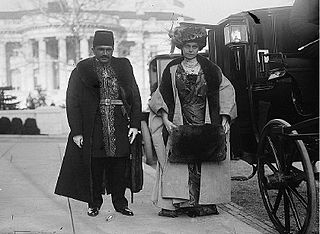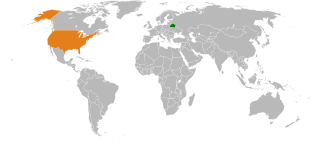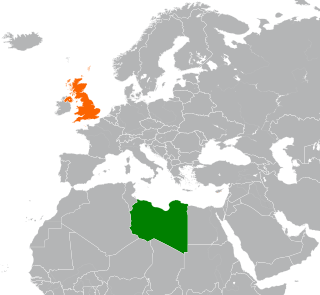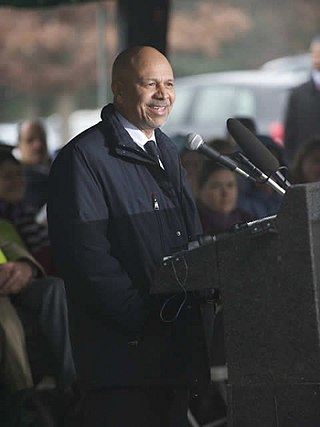
A chargé d'affaires, plural chargés d'affaires, often shortened to chargé (French) and sometimes in colloquial English to charge-D, is a diplomat who serves as an embassy's chief of mission in the absence of the ambassador. The term is French for "person charged with business", meaning they are responsible for the duties of an ambassador. Chargé is masculine in gender; the feminine form is chargée d'affaires.

Interstate relations between the United States and Belarus began in 1991 upon the dissolution of the Soviet Union, of which Belarus had been a part. However, the relations have turned sour due to accusations by the United States that Belarus has been violating human rights. Belarus, in turn, has accused the United States of interfering in its internal affairs.

The Distinguished Honor Award is an award of the United States Department of State and USAID. Similar versions of the same award existed for the former U.S. Information Agency and Arms Control and Disarmament Agency. It is presented in recognition of exceptionally outstanding service or achievements of marked national or international significance.

Libya–United States relations are the bilateral relations between the State of Libya and the United States of America. Relations are today cordial and cooperative, with particularly strong security cooperation only after the 2012 attack on the US liaison office or mission in Benghazi. Furthermore, a Gallup poll conducted in March and April 2012 found that Libyans had "among the highest approval" of US leadership in the entire Middle East and North Africa region.

Somalia–United States relations are bilateral relations between the Federal Republic of Somalia and the United States of America. Somalia has an embassy in Washington, D.C., and the United States maintains an embassy in Mogadishu which was reopened in late 2019.

Sudan–United States relations are the bilateral relations between Sudan and the United States. The United States government has been critical of Sudan's human rights record and has dispatched a strong UN Peacekeeping force to Darfur. Relations between both countries in recent years have greatly improved, with Sudan's post-revolutionary government compensating American victims of al-Qaeda terror attacks, the removal of Sudan from the State Department's blacklist of state sponsors of terrorism and the United States Congress having reinstated Sudan's sovereign immunity in December 2020.

The Embassy of Syria in Washington, D.C. is the suspended diplomatic mission of the Syrian Arab Republic to the United States. The final ambassador of the Syrian Arab Republic was Imad Moustapha. A Charge D'Affaires has not been named.

The Embassy of the Islamic Republic of Afghanistan in Washington, D.C. was the primary diplomatic mission of the Islamic Republic of Afghanistan to the United States. The building is located at 2341 Wyoming Avenue N.W. in Washington, D.C.'s Kalorama neighborhood. The chancery is built in the Colonial Revival style.

Relations between Libya and the United Kingdom were initially close and positive after the British Armed Forces helped rebel forces to topple Muammar Gaddafi's regime in the 2011 Libyan Civil War. British officials have visited Libya several times since then, including two visits by Prime Minister David Cameron when large crowds turned out to welcome him. The British Armed Forces are also helping to train Libya's National Army as part of wider cooperation on security matters. Security conditions have deteriorated since 2014, when the United Kingdom suspended operations from their embassy in Tripoli, into a second civil war. In June 2022, the United Kingdom re-opened its embassy in Tripoli.

Ali Suleiman Aujali is a Libyan diplomat who formerly served successively as Libya's ambassador to Malaysia, Argentina, Brazil and the United States. He served as ambassador under the Gaddafi regime, as well as the governments of the National Transitional Council, and the General National Congress. He declined the post of foreign minister under Prime Minister Ali Zeidan in the government of the General National Congress.

The Embassy of Greece in Washington, D.C. is the Hellenic Republic's diplomatic mission to the United States. It is located at 2217 Massachusetts Avenue, Northwest, Washington, D.C. in the Embassy Row neighborhood, near Sheridan Circle. The Embassy complex consists of three buildings. The current ambassador is Alexandra Papadopoulou and first woman in this post.

The foreign relations of Libya were largely reset at the end of the Libyan Civil War, with the overthrow of Muammar Gaddafi and the Second Libyan Civil War. The current Minister of Foreign Affairs since 15 March 2021 is Najla Mangoush. Although many foreign embassies in Tripoli closed down in 2014 due to the conflict in Libya from 2011 onwards, by the end of 2017 thirty diplomatic missions had reopened in the Libyan capital.

International recognition of the National Transitional Council of Libya was given by the majority of international states but was not universal.
American involvement in the Libyan Civil War initially consisted of diplomatic initiatives and sanctions. This was followed by the implementation of the UN-mandated no-fly zone, the development of diplomatic relations with the rebels as well as humanitarian aid, bombing missions to destroy Gaddafi's military capabilities, and diplomatic assistance to the rebels.

Richard Merrill Mills Jr. is an American diplomat serving as the United States ambassador to Nigeria since July 2024. He served as the United States deputy ambassador to the United Nations from 2020 to 2024 and, in that capacity, served as the U.S. Chargé d'Affaires and Acting Permanent Representative to the United Nations between January 20, 2021, and February 24, 2021, when Linda Thomas-Greenfield became ambassador. He previously served as the U.S. Chargé d'Affaires for Canada.














